|
|
|
Sort Order |
|
|
|
Items / Page
|
|
|
|
|
|
|
| Srl | Item |
| 1 |
ID:
111716
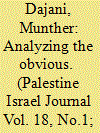

|
|
|
| 2 |
ID:
111728
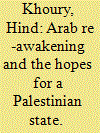

|
|
|
|
|
| Publication |
2012.
|
| Summary/Abstract |
In 1988, the Palestine Liberation Organization(PLO), serving as the representative of thePalestinian people, unveiled the Palestinian PeaceInitiative which would have established a state on 22% of historic Palestine- their own country from which they were expelled in 1948. The initiativepromised that Palestine would live in peace and security next to Israel, whichwas a major historical compromise that eventually took the Palestinianpeople years to absorb. In response, Israel did not only refuse the deal,but also sought to pursue its construction of illegal settlements even moreaggressively in the Occupied Palestinian Territories (OPT) defined bythe 1967 occupation. Current public opinion polls show that 60-70% ofPalestinians continue to support this peace initiative.
|
|
|
|
|
|
|
|
|
|
|
|
|
|
|
|
| 3 |
ID:
111718
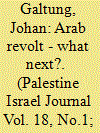

|
|
|
|
|
| Publication |
2012.
|
| Summary/Abstract |
It changes character, like in quantum mechanics, even as we watch. The French revolution did that in the late 1780s and early 1790s. But spring is gone, and revolt is in, so far not revolution. There are layers of rulers and layers of opposition. The unveiling has started.
If winter seeds from a suicide in Tunisia made buds sprout in early spring, then they must have fallen on fertile soil. Events make processes when "stability" is unstable, like the huge power and wealth gaps. The U.S. trick is to make people believe in individual mobility: "If you don't make it, it is your fault." Others see it as a relation: By taking power-wealth from us they got powerful-rich and we powerless and poor. The former is individualist and person-oriented; the latter collectivist and system-oriented. See it that way and revolts follow, like Tahrir Square, like Wall Street. But some resources are needed.
|
|
|
|
|
|
|
|
|
|
|
|
|
|
|
|
| 4 |
ID:
111731
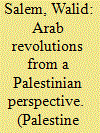

|
|
|
|
|
| Publication |
2012.
|
| Summary/Abstract |
Let me start with the following question: Have Arab countries started the transition to democracy or not? This is the question now being asked around the world. To address this question I will begin with a quotation from Professor Sa'ad Eddin Ibrahim, who suggested that the Arab region has the plight of a triangle of actors. These three actors are al-toghah, al-gulah and alghuzah. Toghah are the authoritarian regimes, gulah are the extremists and ghuzah are the invaders. The thesis of Ibrahim was that it was the toghah, the authoritarian regimes who created the gulah, the extremists, as another despotic response to the despotism of the authoritarian regimes. Despotism creates another form of despotism. Then together the toghah and the gulah, the authoritarians and the extremists, brought the ghuzah, the invaders to the region, such as what happened in Iraq. In order to have democracy in Iraq, you have to do it through an invasion from outside.
|
|
|
|
|
|
|
|
|
|
|
|
|
|
|
|
| 5 |
ID:
111726
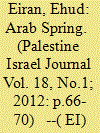

|
|
|
|
|
| Publication |
2012.
|
| Summary/Abstract |
Alongside the risks to Israel, the Arab Spring also offers it opportunities. These include opportunities to advance its strategic objectives as they are defined in "realist" terms of power. But Israel may also be able to advance goals that draw on a "normative" set of preferences, assuming that its objectives include not simply maximizing power but also the conclusion of peace agreements with its neighbors, an end to control over all, or most of, the territories it occupied in 1967, and the strengthening of Israel's liberal-democratic foundations.
|
|
|
|
|
|
|
|
|
|
|
|
|
|
|
|
| 6 |
ID:
111735
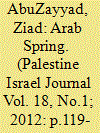

|
|
|
|
|
| Publication |
2012.
|
| Summary/Abstract |
The recent decision of the Arab League foreign ministers (Nov. 12, 2011) to suspend Syria's membership in the Arab League was interpreted by observers as the last act before international intervention in Syria; the same had happened earlier in Libya. But the Arab League's decision came after Syrian President Bashar al-Assad failed to understand the course of events in his country in light of what had happened in other rebelling Arab countries, leaving the Arab League countries with no option but to ask the Security Council to adopt the Arab initiative and impose sanctions against the Syrian regime. Such a decision by the Arab League in the past opened the door for NATO intervention in Libya and eventually may serve to allow outside intervention in Syria as well.
|
|
|
|
|
|
|
|
|
|
|
|
|
|
|
|
| 7 |
ID:
111732
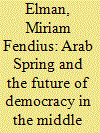

|
|
|
|
|
| Publication |
2012.
|
| Summary/Abstract |
The success of the Arab Spring depends on new governments being able to meet youth's economic expectations, and Israel could still contribute to a new regional conversation on economic and social reform.
|
|
|
|
|
|
|
|
|
|
|
|
|
|
|
|
| 8 |
ID:
111717
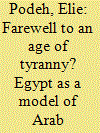

|
|
|
|
|
| Publication |
2012.
|
| Summary/Abstract |
When Hosni Mubarak, looking out of a palace window, saw the demonstrators down below on January 25, 2011, he turned to his advisor and exclaimed: "My God! It's a revolt!" "No, my President," was the answer, "that is a revolution." Well, alright, this legendary quote is usually attributed to French King Louis XVI, on July 14, 1789.1 Yet, judging by the mild response of the Egyptian police forces it is possible that, like his European predecessor, Mubarak did indeed underestimate the significance of the events unfolding before his eyes. The parable draws our attention to the important distinction between a revolt, a takeover and a coup on the one hand, and a revolution on the other.
|
|
|
|
|
|
|
|
|
|
|
|
|
|
|
|
| 9 |
ID:
111734


|
|
|
|
|
| Publication |
2012.
|
| Summary/Abstract |
The Arab Peace Initiative (API) of March 2002 was intended to revolutionize the Middle East. The new regional agenda offered by the 22 countries of the Arab League represented a historical paradigmatic shift in the relations between Israel and the Arab world. More than a century of conflict between the Arab world and the Zionist movement were to come to an end. If we were to summarize the provisions laid out in the League's decision in Beirut, the fundamental principles are quite simple: All Arab countries would normalize their relations with Israel in return for full Israeli withdrawal from the Golan Heights, the Gaza Strip and the West Bank (including East Jerusalem). An independent Palestinian state would be established, and a just and agreed solution would be found for the Palestinian refugee problem, in accordance with Resolution 194 of the United Nations General Assembly. All Arab countries would consider the Arab-Israeli conflict to be over and done, enter into peace agreements with Israel and provide security to all countries of the region. All League members accepted the proposal, and it was also endorsed by all 57 states of the Organization of Islamic Cooperation (all Muslim countries) at their meeting in Tehran.
|
|
|
|
|
|
|
|
|
|
|
|
|
|
|
|
| 10 |
ID:
111721


|
|
|
|
|
| Publication |
2012.
|
| Summary/Abstract |
Nothing, it seems, is quite what it seems. If even illustrious experts spectacularly failed to foresee the seismic shifts engulfing the Arab world, how is the ordinary observer supposed to make sense of events? How may we distinguish fact from fiction, wheat from chaff, real value from face value?
Turning to the political class for answers is no panacea, for insight and prescience are hardly their strong suits, either. Take Israeli Prime Minister Binyamin Netanyahu: no sooner had he boasted "there is only one country in the whole of the Middle East that has no troubles, no protests - that's Israel," than his country's social protest movement erupted beneath him.
|
|
|
|
|
|
|
|
|
|
|
|
|
|
|
|
| 11 |
ID:
111725
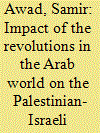

|
|
|
|
|
| Publication |
2012.
|
| Summary/Abstract |
To what extent does the "Arab Spring" influence the Palestinian-Israeli conflict?
Many turbulent events are currently affecting the Palestinian and Arab sphere, starting with the American position against Palestine's bid for statehood at the United Nations Security Council, and their defeating a proposal against Israeli settlement expansion. As a matter of fact, this was another expression of the well-known American stand consistently biased in favor of Israel.
This means that the Americans have lost their position as an honest interlocutor between the Palestinian and the Israelis.
Huge changes are evolving in the Arab World as a whole in view of the popular uprisings in Tunisia, Egypt, Libya, Yemen and Syria. The Palestinian situation does not differ much from that of other Arab peoples and regimes, despite the fact that it has been defined by their major confrontation with the Israeli occupation. This does not mean that the experiences of the neighboring Arab people will pass without affecting Palestine, entailing demands for more freedoms, democracy and fighting against corruption. It is worth noting that the Arab Spring uprisings did not point at all to the Palestinian cause or the Israeli occupation, since they are more concerned with internal affairs, arranging their priorities according to the national agenda and not the external policy of the state.
|
|
|
|
|
|
|
|
|
|
|
|
|
|
|
|
| 12 |
ID:
111720


|
|
|
|
|
| Publication |
2012.
|
| Summary/Abstract |
In early August 2011, on the same day that Hosni Mubarak - once president of Egypt, now convicted for conspiring to kill protesters during the demonstrations that led to his ouster - was lying on a hospital bed in a Cairo court cage, Israeli Labor Member of Knesset Benjamin Ben-Eliezer revealed an amazing secret. He told the media that he and Prime Minister Binyamin Netanyahu had offered Mubarak political asylum. The offer came shortly after Feb. 10, 2011, the day when Mubarak transferred his authorities and left Cairo to go to his Sharm al-Sheikh palace. Sharm al-Sheikh is not far from Eilat, the city where Israel offered him asylum.i
Had Mubarak accepted this offer, Israel would clearly have put itself in the position of being the Arab people's enemy, perhaps not far behind Bashar al-Assad, the Syrian president, and Muammar Gaddafi of Libya. Mubarak's rejection rescued Israel from a very unpleasant situation, yet the proposal shows that Israel prefers the old order. Whereas many people around the world see mostly hope for this region, Israel sees risks. The Arab Spring is Israel's winter. No one has expressed this idea more eloquently than the skillful orator (in American English) Netanyahu.
|
|
|
|
|
|
|
|
|
|
|
|
|
|
|
|
| 13 |
ID:
111722
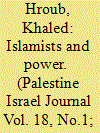

|
|
|
|
|
| Publication |
2012.
|
| Summary/Abstract |
Election results in the post-revolution countries emphasize the prevailing long-term expectation, which is that the next stage in the Arab region will be characterized by the presence of Islamists in power one way or another in more than one Arab country. The Islamists' victory in the Egyptian elections came after that of the Justice and Development Party in Morocco, which in turn came after victory of the Renaissance Movement in Tunisia. In Libya, there are expectations, not far from reality, for the victory of similar Islamist parties or those close to them in the event of organized state elections. In Jordan, Yemen and Algeria no one can underestimate the size of Islamic currents and their access to high ratings in state elections. Although the experience of Arab Islamists in government has not been bright, at least in the cases which we have witnessed in past years in Sudan and Gaza, that has not reduced popular support for these currents. Any failure of these experiments was attributed to external factors - Western pressures and/or Israeli policies in the case of Hamas - more than to the ability of the Islamists and their efficiency in government. Thus, the vast majorities of Arab electorates seem bent on entrusting the Islamists with power for a period of time. Arab publics need to delve into a real and broad experience with the Islamists so they can judge them objectively, away from religious passion and semi-blind support.
|
|
|
|
|
|
|
|
|
|
|
|
|
|
|
|
| 14 |
ID:
111736
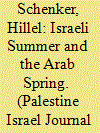

|
|
|
|
|
| Publication |
2012.
|
| Summary/Abstract |
Today we are clearly witnessing a global phenomenon, which began in Tunisia and Egypt and then spread to Spain, Greece and many other European countries, to Israel, the United States with the Occupy Wall Street movement, and even, incredibly, to the Russia of Vladimir Putin.
The average Israeli probably resists the idea that the protests in Tunisia and Egypt were the forerunners of and spark for the Israeli summer of protest. Even the protest leaders tend to think in home-grown terms. However, there was a prominent sign at the Rothschild Boulevard tent encampment which read "Rothschild, corner of Tahrir Square." And I saw people carrying signs at one of the marches/demonstrations through Tel Aviv which read "Walk like an Egyptian." There is no doubt in my mind that, at least at the subconscious level, the beginnings of the Arab Spring were the sparks which helped to ignite the Israeli summer.
|
|
|
|
|
|
|
|
|
|
|
|
|
|
|
|
| 15 |
ID:
111724
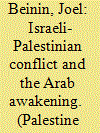

|
|
|
|
|
| Publication |
2012.
|
| Summary/Abstract |
The March 15 Youth Movement, whose name comes from demonstrations held in the West Bank and Gaza Strip that day to demand unity between Fateh and Hamas, is the most direct Palestinian expression of the "Arab Awakening" of 2010-11. The next day, March 16, Fateh's leader, Palestinian Authority (PA) President Mahmoud Abbas, announced his willingness to travel to Gaza to conduct unity talks with Hamas. A reconciliation agreement was signed in Cairo on May 4.
Implementation of the Hamas-Fateh accord stalled earlier this year because Abbas insisted on retaining Salam Fayyad as prime minister of the PA. Hamas regards Fayyad as too subservient to Israel and the West. It particularly resents his cooperation with the United States in creating the new National Security Forces, popularly known as the "Dayton Brigades" after their first trainer, Lt. Gen. Keith Dayton of the US Army. A major task of these units has been to suppress Hamas in the West Bank, and it has done so to Israel's satisfaction.
|
|
|
|
|
|
|
|
|
|
|
|
|
|
|
|
| 16 |
ID:
111729


|
|
|
|
|
| Publication |
2012.
|
| Summary/Abstract |
The challenge is to translate the technological revolution, which has made us more equal in our access to information and communications tools, into a New World Order where we can become equal on all levels of life.
|
|
|
|
|
|
|
|
|
|
|
|
|
|
|
|
| 17 |
ID:
111733
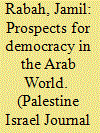

|
|
|
|
|
| Publication |
2012.
|
| Summary/Abstract |
Since the beginning of this year, tangible changes have occurred either directly with the overthrow of the regimes in Tunisia, Egypt and Libya, or indirectly as was the case in Morocco and Jordan, where anger was absorbed through some reforms. However, the causes of this were neither new nor accidental. Discontent with Arab regimes has always been present and widespread within liberal and Islamic circles, albeit for different and divergent reasons.
|
|
|
|
|
|
|
|
|
|
|
|
|
|
|
|
| 18 |
ID:
111727
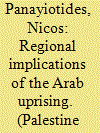

|
|
|
|
|
| Publication |
2012.
|
| Summary/Abstract |
The "Arab Spring" aggravates the security dilemma between Israel and its neighbors, and the Arab-Israeli conflict and the Palestinian problem cannot remain unaffected by the outcomes of the uprisings.
|
|
|
|
|
|
|
|
|
|
|
|
|
|
|
|
| 19 |
ID:
111730
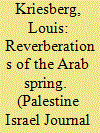

|
|
|
|
|
| Publication |
2012.
|
| Summary/Abstract |
Popular outbursts protesting objectionable conditions or policies and seeking to change them often move quickly from one location to another. The diffusion within a society where people share distressed circumstances and suddenly believe they can overcome them is more readily explained than is diffusion from one society to another. However, the processes for the spread of popular uprisings and the risks and challenges of such movements within and among societies have some similarities.
|
|
|
|
|
|
|
|
|
|
|
|
|
|
|
|
| 20 |
ID:
111719


|
|
|
|
|
| Publication |
2012.
|
| Summary/Abstract |
The potential success of the transition to democracy in both Tunisia and Egypt will affect many Arab countries, determining their destinies. Tunisia represents a test case, a laboratory-like situation for understanding the latest developments in the Arab world. In light of the historiographical difficulty in examining events of such a recent nature, it would be of use to Arab researchers and readers to bring together scholarly and scientific analyses about this case in a book to assist in understanding the reasons for the eruption of revolutions in the Arab world.
|
|
|
|
|
|
|
|
|
|
|
|
|
|
|
|
|
|
|
|
|